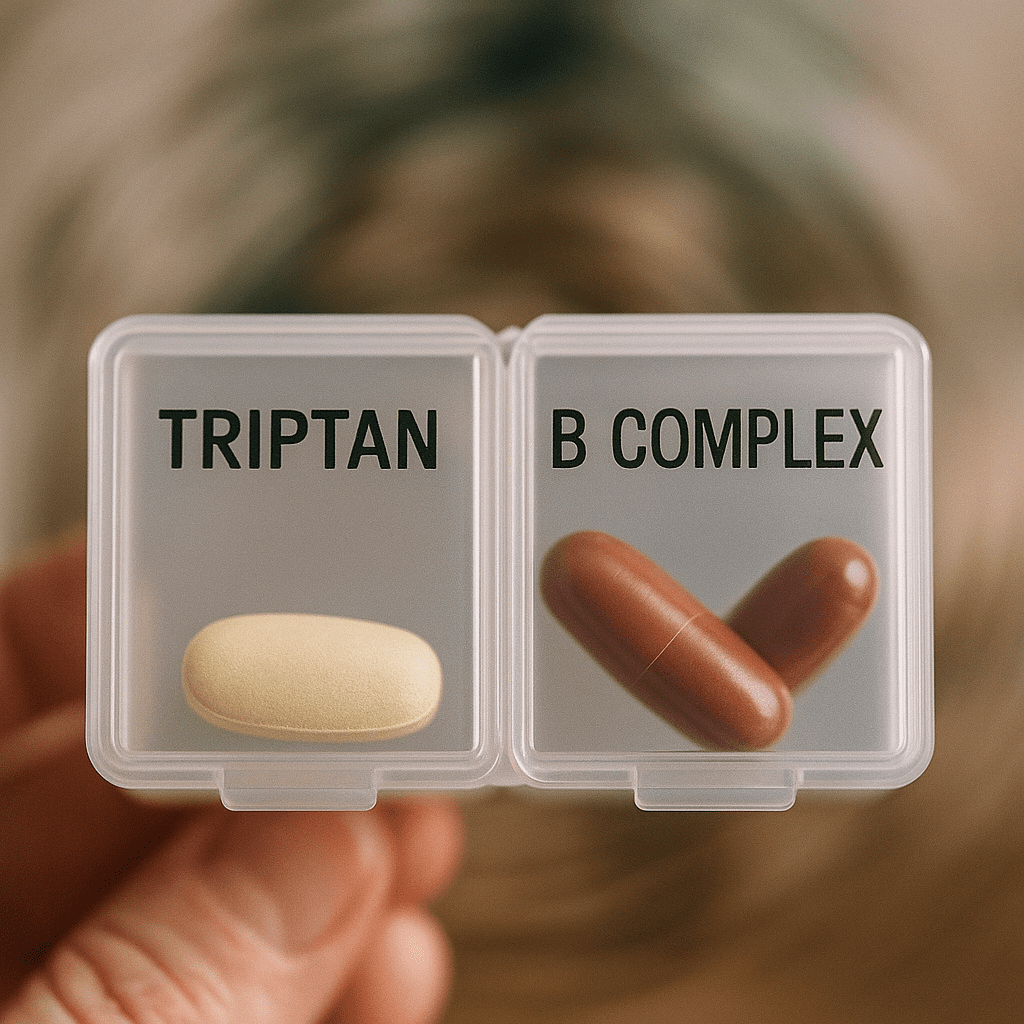Can B vitamins make brain fog from migraine meds worse? For anyone juggling supplements with medications like triptans or topiramate, the foggy-headed feeling can be hard to pin down.
This article breaks down how migraine drugs affect cognition, how B vitamins may influence that effect, and what practical steps can help reduce the mental cloud.
We’ll explore the known interactions, examine the evidence behind supplement and drug combinations, and share strategies for staying clear-headed while managing migraines.
Summary / Quick Answer
Can B vitamins worsen brain fog from migraine meds? Not directly, but certain combinations may increase sedation or cognitive slowing. Here’s a snapshot:
- Triptans may cause mild brain fog, especially in sensitive users.
- Topiramate is strongly linked to memory and concentration issues.
- Vitamin B6 with sedative agents may add to drowsiness.
- Vitamin B12 might counteract sedation in rare cases.
- Riboflavin (B2) is well tolerated, with no known fog-inducing interactions.
To reduce fog:
- Time doses strategically
- Explore alternative formulations
- Consider caffeine cautiously
- Track symptoms and side effects
How Migraine Medications Affect Mental Clarity
When a migraine hits, relief is the top priority. But for many, that relief comes with a mental cost. Several prescription migraine medications, especially triptans and topiramate, can lead to cognitive side effects often described as “brain fog.”

What Is Migraine-Related Brain Fog?
Migraine brain fog refers to mental sluggishness during or after an attack. You might feel:
- Slower thinking
- Trouble finding words
- Difficulty concentrating
- Memory lapses
According to the American Migraine Foundation, brain fog is a common but under-discussed symptom of both migraine itself and its treatment.
Triptans and Cognitive Side Effects
Triptans, such as sumatriptan and rizatriptan, target serotonin receptors to constrict blood vessels and block pain pathways. While effective, they often cause mild sedation or a “heavy” feeling in the body. Side effects can include:
- Dizziness
- Sleepiness
- Fatigue
- Muscle weakness
Some patients report feeling mentally dull or disconnected – symptoms that may overlap with those caused by the migraine itself.
Topiramate: A Deeper Cognitive Concern
Prescribed for prevention rather than acute relief, topiramate is associated with more pronounced effects:
- Language difficulties
- Slowed thought processes
- Short-term memory loss
- Reduced attention span
Roughly 1 in 10 users experience moderate cognitive issues, especially during the early phase of treatment.
| Medication | Cognitive Side Effects | Risk Level |
|---|---|---|
| Triptans | Mild sedation, dizziness | Low to Moderate |
| Topiramate | Memory loss, speech problems | Moderate to High |
Do B Vitamins Interact with Migraine Meds?
B vitamins are essential for nerve health and energy metabolism, but do they mix well with migraine medications? Let’s break it down by vitamin.

Vitamin B6 (Pyridoxine)
B6 is involved in neurotransmitter synthesis and is often used alongside doxylamine to treat nausea. However, doxylamine is sedating—and combining it with already-sedating meds like triptans could increase drowsiness.
Alone, B6 doesn’t appear to worsen fog. But in combination with sedatives, it may have a compounding effect.
Vitamin B12 (Cyanocobalamin)
An interesting study in Medical Hypotheses suggested that high-dose hydroxocobalamin (a form of B12) might reduce sedation from tranquilizers or alcohol. Though not tested directly with migraine meds, the implication is that B12 could, in theory, support clearer thinking when sedation is a concern.
However, data remains limited and mostly anecdotal.
Riboflavin (Vitamin B2)
Riboflavin is often recommended for migraine prevention at doses up to 400 mg/day. It’s generally safe, and its most common side effect is harmless yellow urine. There’s no evidence linking B2 to increased cognitive side effects from migraine medications.
| B Vitamin | Known Interaction with Migraine Meds | Sedation Risk | Cognitive Cloud Concern |
| B6 | Only with sedatives like doxylamine | Low to Moderate | Low |
| B12 | May reduce sedation in rare cases | None | Possibly beneficial |
| B2 | No known interaction | None | None |
Tips to Reduce Brain Fog Safely
If brain fog is disrupting your life, there are several practical ways to minimize its impact—whether it’s triggered by the migraine itself or your medication stack.
1. Adjust Medication Timing
Taking triptans early in the migraine may reduce severity and limit the need for higher doses. According to The Migraine Trust, they work best when symptoms are still mild.
- Avoid using triptans more than twice weekly
- Leave a 2-hour window between doses when needed
- Discuss dosage timing with your doctor
2. Track Patterns with a Headache Journal
Keeping a diary that notes when you take medications, your supplement timing, and brain fog episodes can reveal helpful patterns. It can also guide better decisions with your healthcare provider.
3. Consider Formulation Swaps
Some people find nasal sprays or injections less cognitively disruptive than oral triptans. Others may tolerate frovatriptan or naratriptan better due to their slower onset and longer duration.
4. Use Caffeine Strategically
Caffeine enhances the pain relief effect of triptans and NSAIDs. A 2023 review found 100 mg or more improves efficacy. Because caffeine is a stimulant, it may also offset fatigue—but overuse can worsen migraines or interfere with sleep.
Curious about supplement interactions? See how melatonin interacts with SSRIs and SNRIs here.
5. Watch for Combo Risks
Some supplement and drug pairings aren’t well studied. For example, pyridoxine-doxylamine may increase sedation when layered with other medications. Also be aware of anxiety spikes with SAM-e and MAOIs covered here.

Final Thoughts
Combining B vitamins with migraine meds doesn’t appear to directly worsen brain fog – but sedative overlap and cognitive side effects of some drugs deserve attention. Triptans can cause short-term fogginess, while topiramate may produce more serious cognitive issues.
Understanding how each supplement and medication fits into your overall plan is key. Tracking symptoms, adjusting timing, and discussing options with your doctor can help you stay clear-headed without compromising migraine control.
For related insights, explore our coverage on melatonin and antidepressants or natural remedies for brain fog.

